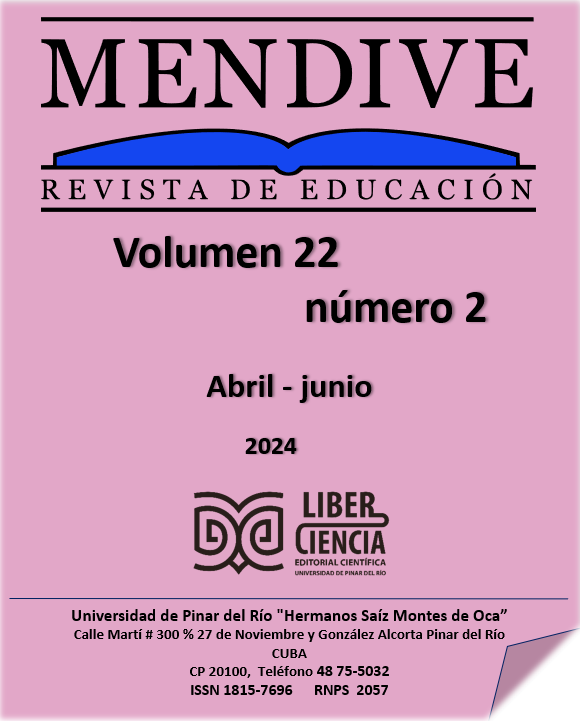The formation of investigative competence in the Technical Council of the Pre-University
Main Article Content
Abstract
Cuban education is focused on a series of transformations, named as the Third Improvement of the National Education System. The Pre-University is no exception due to the importance it has as a prelude to the university, the preparation of its teachers is necessary with emphasis on the formation of research competence to achieve the goal and objectives of the educational level. The article aims to socialize the diagnosis on the formation of research competence in the "Eduardo García Delgado" Urban Pre-University Institute, in the Trinidad municipality, Sancti Spíritus province. The result of the diagnosis on the formation of investigative competence in the Technical Council of the Pre-University was based on the theoretical study and the systematization of lived experiences about how the investigative work of teachers was conceived and their abilities to fulfill their scientific-research function. . The educational context in which the diagnostic study took place was the "Eduardo García Delgado" Urban Pre-University Institute, Trinidad municipality, Sancti Spíritus province. Theoretical methods such as analytical-synthetic and inductive-deductive and empirical methods such as document review, systematization of experiences, survey and interview were used. In addition, the descriptive statistics method was used to process the data obtained from the application of the diagnostic instruments. The results obtained allowed us to identify the strengths and weaknesses of the Pre-University Technical Council on the formation of investigative competence and to design proposed solutions, through the use of the scientific method.
Downloads
Article Details

This work is licensed under a Creative Commons Attribution-NonCommercial 4.0 International License.
References
Aular de Durán, J., Marcano, N., & Moronta, M. (2009). Competencias investigativas del docente de educación básica. Laurus, 15(30), 138-165.
Aguiar Santiago, X. M. y Rodríguez Pérez, L. (2018). La formación de competencias pedagógicas en los profesores universitarios. EDUMECENTRO, 10(2), 141-159 http://scielo.sld.cu/scielo.php?script=sci_arttext&pid=S207728742018000200011
Barriga, E., Gracenea, M., Sáez, I., Sabido, J., Bellatti, I., Garcia, M. y Baques Quesada, J. (2021). ¿La competencia científica tiene género? Igualdad de oportunidades en ciencia para un mejor recorrido formativo del alumnado universitario. Revista CIDUI, (5). https://raco.cat/index.php/RevistaCIDUI/article/view/389979/485619
Buendía, X. P., Zambrano, L. C, y Insuasty, E. A. (2018). El desarrollo de competencias investigativas de los docentes en formación en el contexto de la práctica pedagógica. Folios, 47, 179-195.
Del Valle G., L. y Mejía A., L. (2016). Desarrollo de competencias científicas en la primera infancia. Un estudio de caso con los niños y las niñas del nivel de educación preescolar, grado Transición, de la Institución Educativa Villa Flora, de la ciudad de Medellín. Íkala, Revista de Lenguaje y Cultura, 21(2), 217-226. DOI: 10.17533/udea.ikala.v21n02a07
Hernández et.al, (2014). Metodología de la investigación. 6ta edición. Editorial MC Graw-Hill.
Juárez, D. y Torres, C. A. (2022). La competencia investigativa básica. Una estrategia didáctica para la era digital. Sinéctica, revista electrónica de educación, (58), e1302. https://doi.org/10.31391/S2007-7033(2022)0058-003
Martínez, S., y Fariñas, J. L. (07 de marzo de 2012).Desarrollo de la competencia elaborar programas informáticos.Didasc, 3(2), 1-20. https://dialnet.unirioja.es/descarga/articulo/4229691.pdf
Navarro, S.M et.al (2021). La investigación sobre el III perfeccionamiento del sistema nacional de educación en Cuba. Apuntes. La Habana: Editorial Pueblo y Educación.
Oquendo-González, E. J., & Pastrana-Gómez, L. C. (2020). El diseño de cursos integrados y su incidencia en el desarrollo de la competencia científica/The design of integrated courses and their impact on the development of scientific competence. Educación Y Sociedad, 18(2), 115. https://revistas.unica.cu/index.php/edusoc/article/view/1565
Reiban, R.E. (2018). Las competencias investigativas del docente universitario. Universidad y Sociedad, 10(4), 75-84. http://rus.ucf.edu.cu/index.php/rus
Reynosa Yero M., & Peña Acosta Y. (2015). La organización escolar y la actividad científica educacional: retos en la transformación educacional. Opuntia Brava, 7(3), 17-26. https://opuntiabrava.ult.edu.cu/index.php/opuntiabrava/article/view/305
Samaja, J. (2003). Epistemología y Metodología. Elementos para una teoría de la investigación científica. Editorial Eudeba.
Tamayo, M. (2003). El proceso de la investigación científica. Editorial Limusa.
Velázquez et al. (2019). Desarrollo de competencias investigativas formativas: retos y perspectivas para la Universidad. Dilemas Contemporáneos: Educación, Política y Valores. VI (Edición Especial, 3) https://www.dilemascontemporaneoseducacionpoliticayvalores.com
Zabalza Beraza, M. Ángel. (2015). Las competencias en la formación del profesorado: de la teoría a las propuestas prácticas. Tendencias Pedagógicas, 20, 532. https://revistas.uam.es/tendenciaspedagogicas/article/view/2012


